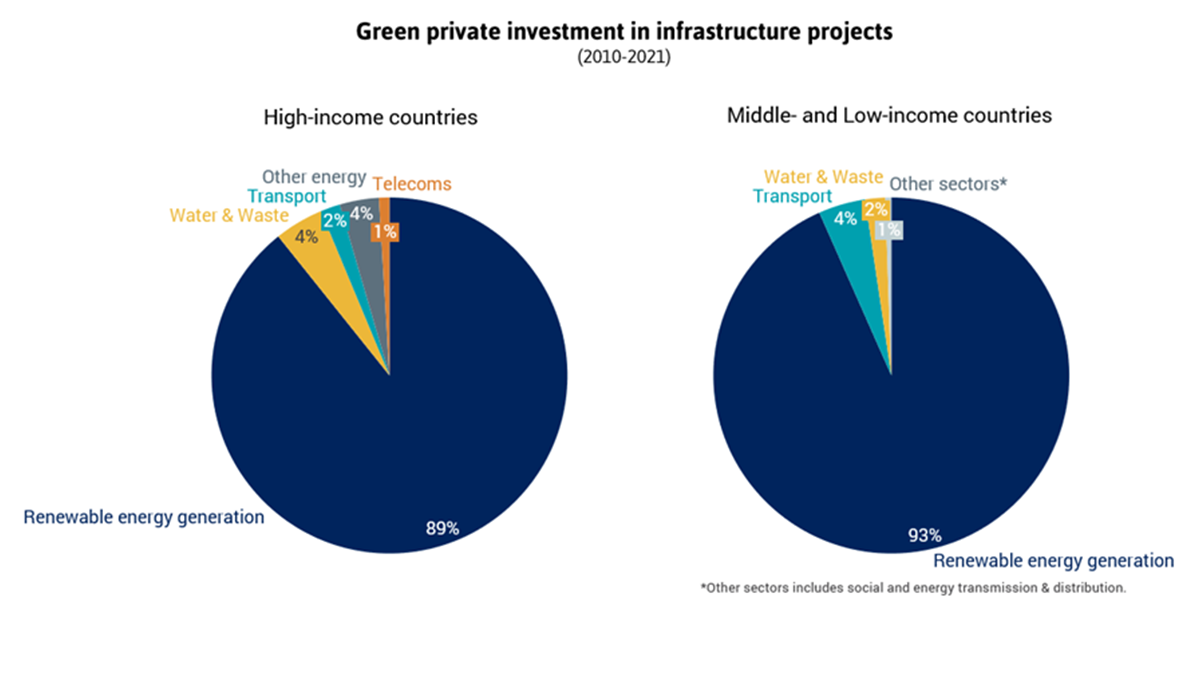1103 results found
Featured results



More results
In the context of the US Inflation Reduction Act, GI Hub’s Director of Knowledge Mobilisation, Sam Barr explores the complexity of intergovernmental coordination and the risks this poses to climate action.
Infraclear has gathered one of the world’s biggest databases of infrastructure project agreements and developed machine learning and natural language processing algorithms to extract granular data on terms.
The Madrid 360 Environmental Strategy was presented in September 2019 to reduce nitrogen oxides (NOx) emitted into the atmosphere by 11.3% by 2023, a reduction of 1,563 tonnes of NOx per year
China Eximbank actively uses the People’s Bank of China’s facilities of carbon emissions to promote green and low-carbon development.
With an installed capacity of 450MW, accounting for 37.5% of the total installed capacity, the project is part of the Zhangjiakou-Beijing Renewable Energy-Powered Clean Heating Demonstration. It has the largest single investment and the highest construction standard of its kind.
The Colouring Cities Research Programme (CCRP) is developing a model for open data platforms that uses an open-source code for easy-to-set-up-and-run platforms (managed by academia) that enable access to the highest quality, comprehensive national building footprint data available
The Trial Reservoir approach to technology trials has universal potential globally to increase and accelerate uptake of clean technologies. While this approach to trial funding has not yet been replicated, Isle Utilities are in advanced talks with the Inter-American Development Bank (IDB) regarding a Latin American-specific project, funded by the IDB.
The Digitalisation Impact Tool was developed to support the Green Information and Communications Technology (ICT) strategy for the Ministry of Energy and Infrastructure (MOEI), United Arab Emirates with the objective of the Digitalisation Tool is to document the positive impact of digitalisation on the environment, MOEI, and MOEI’S customers
The Ministry of Energy and Infrastructure (MOEI), United Arab Emirates developed the sustainability tools to help project teams track, document, and monitor data relating to sustainability during the project lifecycle and to improve decisionmaking
The Arab Roadmap roadmap aims to attract investment towards decarbonising the construction sector, with a view to achieve Paris Agreement goals by 2050. The Arab Roadmap acts as a blueprint for the Arab countries, supporting the initiation of each country’s national roadmap by addressing countries’ diverse conditions, including climatic, economic, demographic, energy emissions, and urbanisation patterns.
The UK has developed a government-led program that works with academia and industry to support and promote increasingly sophisticated digitalisation, digital modelling, and information management and sharing, supporting the optimisation of the built environment across its lifecycle and ensuring this is done in a way that maintains safety, security, and resilience.
The Asian Infrastructure Investment Bank (AIIB) platform takes a holistic approach to financing support for the development and deployment of technology for infrastructure projects. This support is in the form of knowledge, networks, capital, innovation services and regulatory dialogue with members, investment leads, and clients.


This report on Infrastructure Transition Pathways, prepared for the G20, examines what governments are doing to incorporate infrastructure transition pathways into their infrastructure plans.

The GI Hub’s CEO Marie Lam-Frendo and Director of Engagement, Rory are on the ground at COP27, read about their week ahead.
During COP27, our guest authors from WAPPP, CPCS Transcom Ltd and Princeton University explore recommendations for integrating and mainstreaming three climate-related risks.

Green investment in infrastructure outside of renewables is limited. While renewables represent almost 90% of total green private investments in infrastructure projects, green investment in other sectors only represent 14%.


At COP27 this week, GI Hub CEO, Marie Lam-Frendo moderated a panel session on Accelerating, Targeting, and Blending Sustainable Investment at the Sustainable Markets Initiative Terra Carta Action Forum.
This is a testament to multilateralism, even in challenging times
The Global Infrastructure Hub welcomes yesterday’s launch of the G20’s Pandemic Fund to address pandemic prevention, preparedness, and response, particularly in vulnerable countries.



 Transformative Outcomes Through Infrastructure
Transformative Outcomes Through Infrastructure














